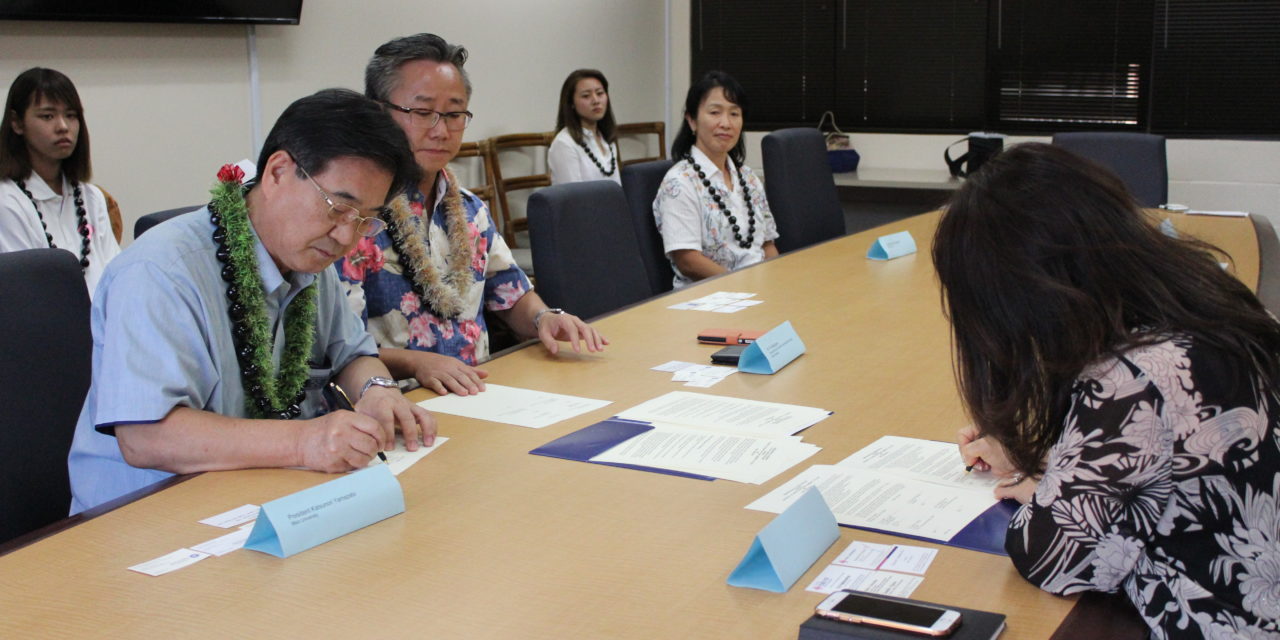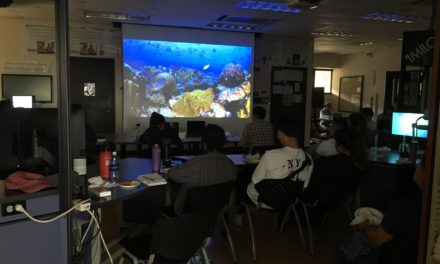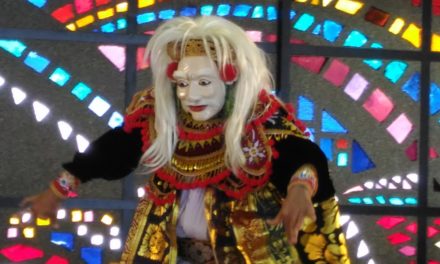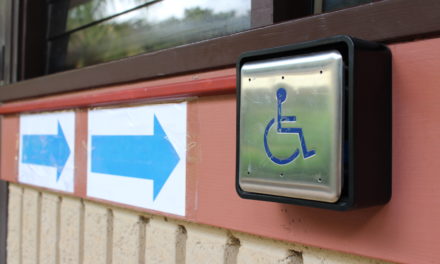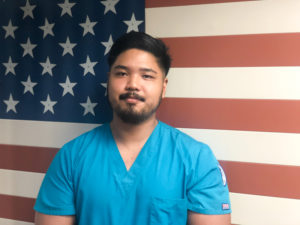By Lexus Yamashiro | Staff Writer
On Wednesday, students and faculty members of KCC and Meio University watched as President Natsunori Yamazato, executive director Toi Nakayama of the Center for International Exchange, chair Joe Overton of the Honda International Center, and interim vice chancellor Susan Kazama of Academic Affairs sign an agreement for Meio University’s International Academic Exchange Program to send its students to KCC to study. According to Yamazato, the exchange program made between KCC and Meio University will go into effect immediately.
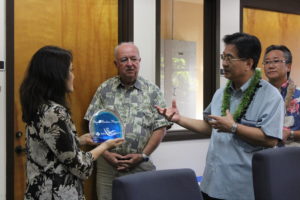
Susan Kazama (left) was presented with a customized Ryukyu glass that displays Meio University’s name and motto. (Photo by Lexus Yamashiro)
Located in Nago in the Okinawa Prefecture of Japan, Meio University continues to reach out to colleges around the world to create partnerships that would allow its students to study abroad and influence them to have an active role in the international community. With 16 countries that Meio University has connected with, the agreement made with KCC is now the university’s 35th partnership created but the first with a community college.
Yamazato, who has served as Meio University’s president for four years, said that his decision in wanting to send Okinawan students to KCC was mainly due to the strong reputation that KCC possesses. In the past, he recommended KCC to a university in Northern Kyushu to sign an agreement with for an exchange program, leaving Yamazato wondering why he did not do that for Meio University.
As a person who lived in Hawaiʻi for two years and earned his master’s degree in English from UH Mānoa, Yamazato sees Hawaiʻi and KCC as a beneficial educational environment for his students.
“I feel safe to send our students to Hawaiʻi, and there is a strong Okinawan community in Hawaiʻi and they can support our students if they need it,” Yamazato said. “[The students] can learn about Okinawa from [the Okinawan community] … and they can learn lots of things about old Okinawa.”
Although the number of students who will be allowed to attend KCC from Meio University is to be negotiated, interested Okinawan students will be able to study at KCC for one year. Scholarships will be provided by the university to help them with any financial barriers. Yamazato explained that the tuition fees to Meio University can be used as a scholarship for its students’ tuition at KCC.
In preparation for new international students, cybrarian Shari Tamashiro of the Center for Excellence in Learning, Teaching, and Technology (CELTT) is working with faculty members on campus (such as David Uedoi and Grant Itomitsu) to create an Okinawan Club that will provide support and guidance for Meio University students and more.
“One purpose for the club is to provide support for students coming from Okinawa to study at KCC. We can assist getting them oriented to KCC and provide them with a support network,” Tamashiro wrote in an email. “It will be for any Okinawan students who come to KCC to study, not just limited to Meio University students.”
Tamashiro also shared that the Okinawan Club would serve as a resource for the campus to educate those who are interested in learning about Okinawa’s culture, history, and more.
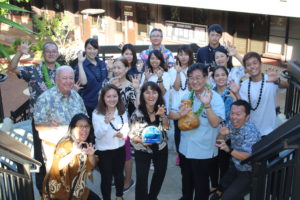
Those of Meio University and KCC came together to show their best shisa (lion) pose. (Photo by Lexus Yamashiro)
“My hope is that KCC will become known as a very ‘Okinawan Friendly’ school to the Hawaiʻi Okinawan community and in Okinawa,” Tamashiro wrote. “Administrators in Okinawa like President Yamazato can feel that their students will be very well taken care of at KCC. I also hope that we can strengthen our ties with the Hawai‘i Okinawan community to benefit our students and our staff.”
Yamazato hopes that with a few of Meio University’s students eager to study abroad at KCC, it will encourage KCC students to study at Meio University. Yamazato welcomes anyone — especially students of Okinawan descent — to study in Okinawa and hopes that faculty and staff members of KCC will want to travel to the university to learn about the various Asian cultures.
“We would like to educate our students so that they play active roles in international communities, and by coming to Kapiʻolani Community College they would interact with international students and students of different cultures,” Yamazato said. “So that would provide them to see … how to live in the world, how to be active in an international society.”

